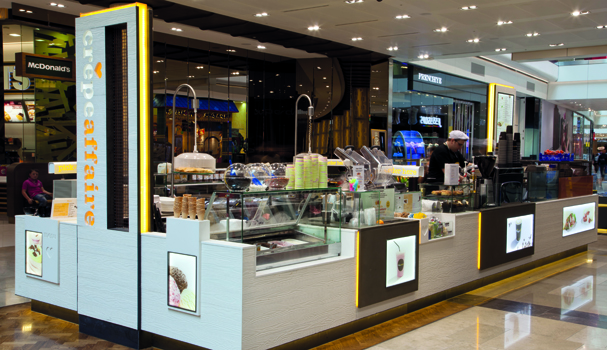By rights, you can’t help but feel that dwelling somewhere behind a company selling crêpes should be a floppy white hat and a hackneyed French accent. Fortunately, life has little room for such narrative convention; rather than the gourmet of cliché, the creative drive behind Crêpeaffaire comes from an experienced business mind. “My background is very corporate,” says founder and managing director Daniel Spinath. Having worked in banking consultancy, an international role with Procter & Gamble, as a general manager at Heinz and a board director for Eurotunnel, Spinath certainly knows a thing or two about big business. “I lived and worked in nine different countries until early 2000 when I said, ‘This is the time for me to take my corporate learning but do something myself’,” he explains.
Crêpeaffaire was in part inspired when Spinath realised that crêpes hadn’t ever received this sort of professional treatment. “You’d associate crêpes a lot more with little stands with Nutella than with a branded, systematic business,” he says. Essentially, Spinath’s vision has been to build an effective model and brand around a fast food product but one that doesn’t come with the perceived negatives often attached to fast food. He draws comparisons to the familiar high street brands Wagamama and Yo! Sushi. “You take a product like noodles or sushi that originally were run by independents and basically brand it,” he says. “At the outset the idea was create a concept, rather than just a product, that can be scaled and have international potential.”
Which is easier said than done. Building an effective understanding of a relatively untested product is far from easy and requires a good deal of knowledge about the market you’re intending to enter. “I did quite a bit of qualitative and quantitative research about how people perceive a product like this,” explains Spinath. “But research has to stop at some point.” Eventually, it becomes necessary to enter into the situation and test things out in what Spinath dubs a ‘live laboratory’. And so Crêpeaffaire started as a single location in Hammersmith. He continues: “We looked at what worked”and didn’t work, rectified what didn’t work and built on what does, and then expanded”into the right locations.”
This organic method of development has very much been a cornerstone of the Crêpeaffaire strategy. Spinath feels that going for seed funding just isn’t feasible for a venture without a tried and tested model and therefore a much more incremental finance strategy is required. “You start with one shop, see how it works and, initially, fund your new sites organically by cashflow from the previous sites,” he explains. This not only helped keep the business growing in a natural way but it has also helped iron out wrinkles in the overall model in a live situation.”
“We’ve learned what works, we’ve”learned what doesn’t work, we’ve made”our mistakes – we have enough confidence and enough experience now to say we understand what works and what doesn’t,””he remarks. “Now it makes sense, with”proof of concept, to scale it.”

Josh Russell
When he isn't tooling around on trains in a tux like the Daniel Craig of the Greater Anglia transport system, Russell spends his time living the glamourous life of an enterprise journalist, judging Digital Business of the Year at the National Business Awards and attending conferences like NixonMcInnes' Meaning 2013. However, like all good secret agents, Russell lives a double life - in his case, as a closet revolutionary. Social enterprise, sustainable business and collaborative practices are his true passions, something that he has had plenty of opportunity to air in his features here at Elite Franchise.

Josh Russell
When he isn't tooling around on trains in a tux like the Daniel Craig of the Greater Anglia transport system, Russell spends his time living the glamourous life of an enterprise journalist, judging Digital Business of the Year at the National Business Awards and attending conferences like NixonMcInnes' Meaning 2013. However, like all good secret agents, Russell lives a double life - in his case, as a closet revolutionary. Social enterprise, sustainable business and collaborative practices are his true passions, something that he has had plenty of opportunity to air in his features here at Elite Franchise.
































